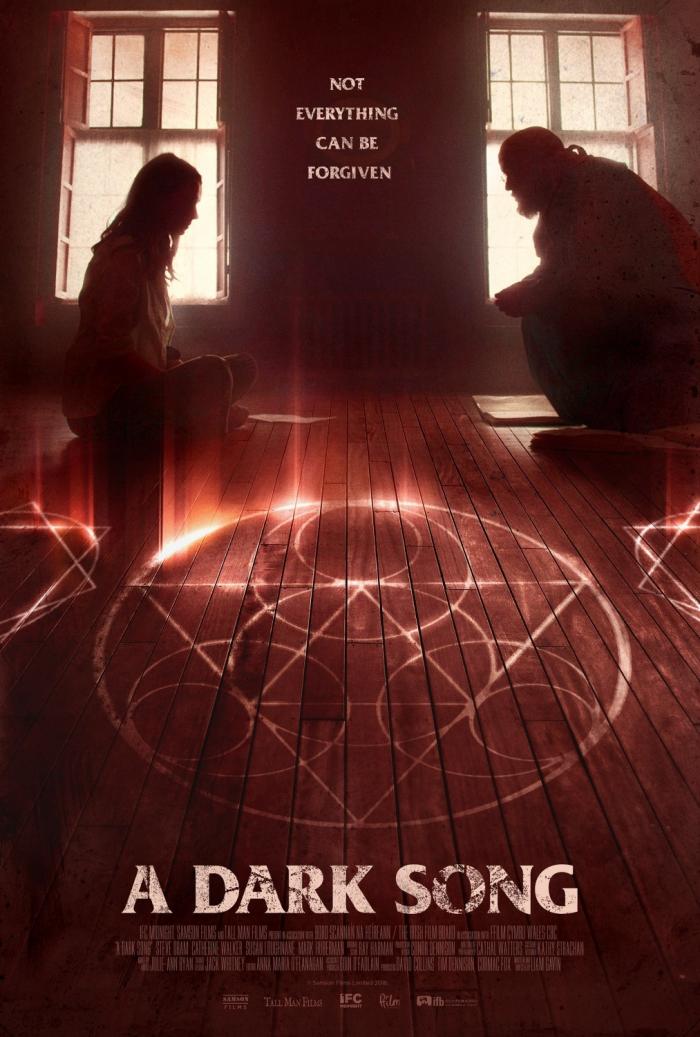You are here
Home › Movies › Writer-Director Liam Gavin's Film 'A Dark Song' Is Enticing Exploration Of The Occult ›Writer-Director Liam Gavin's Film 'A Dark Song' Is Enticing Exploration Of The Occult
FTC Statement: Reviewers are frequently provided by the publisher/production company with a copy of the material being reviewed.The opinions published are solely those of the respective reviewers and may not reflect the opinions of CriticalBlast.com or its management.
As an Amazon Associate, we earn from qualifying purchases. (This is a legal requirement, as apparently some sites advertise for Amazon for free. Yes, that's sarcasm.)

The loss of a loved one is unquestionably the cruelest of life’s misfortunes. When that passing is of a child, the grief is compounded by a sense of guilt; all responsible parents feel a protective duty towards their offspring, and when a son or daughter dies through illness, accident or, most tragically of all, at the hands of another, the psychological weight accompanying the event can drag even the sturdiest soul into the depths of despair. But what if there was a way to contact your dearly departed? What would you endure to gaze upon their face, to hear their cherished voice, to feel their touch? To imagine such a possibility is to abandon all worldly reason and delve unflinchingly into the mystic. But is there truly something tangible in that veil between life and death? And do any of us dare cross those invisible boundaries to find out?
Those are the questions posed by writer-director Liam Gavin in his entrancing 2016 exploration of the occult, A Dark Song (available to stream free on Tubi). When bereaved mother Sophia (Catherine Howard) rents a run-down manor house in the remote Welsh countryside, it’s with the intent of performing a complex ritual meant to foster communication with her murdered seven-year-old son, Jack. Despite warnings from her concerned sister Victoria (Susan Loughnane), Sophia searches for a magician capable of guiding her through the rites before settling on streetwise arcane adept Joseph Solomon (Steve Oram), whose rough-and-tumble attitude masks vast otherworldly knowledge. Together this odd pair seclude themselves away to perform their ceremony, but as days slip into weeks, then months, with nothing to show for their arduous esoteric efforts, Sophia and Joseph slowly begin turning on one another…
A Dark Song is an occult-oriented story crafted in the style of classic British horror (of which 1957’s M.R. James-inspired Curse of the Demon and the later Hammer production of Dennis Wheatley’s The Devil Rides Out are two of the most notable). In these films there is often thematic conflict between the logical and the illusory; the protagonists are usually well-educated non-believers forced to reassess their scientific worldview when confronted with irrefutable proof of the supernatural. Such is the case here: at the movie’s onset Sophia is depicted as a hard-headed rationalist edged into taking the metaphysical plunge due to the unrelenting anger caused by her son’s death. Prior to acquiring the manor she’s cleansed herself with months of sexual abstinence and fasting, all in the hopes that what follows will grant her the power she seeks. Instead she finds an ever-escalating series of physical trials that border on abuse, and worse: sitting motionless for days in the same spot, being drenched in water and left to freeze—at one point Joseph actually kills her by drowning Sophia in the bathtub only to revive her through CPR—but mounting frustration at the rite’s seeming ineffectiveness only plunges her further into gloom.
With limited means and a cast consisting primarily of two people, productions like A Dark Song stand or fall on the talents of its actors, and the interactions between leads Howard and Oram faultlessly support both the narrative and the audience’s suspension of disbelief. As Joseph, Oram is by turns wryly funny, manipulative, and explosive; like the Solomon of legend with whom he shares a surname, Joseph has mastery over the hidden realms: he’s precise about the ritual placings, movements and meanings, and becomes rapidly rabid when such rules are breached. He claims it’s in the name of protecting themselves against malevolent forces, but when Joseph violates Sophia’s trust so he can satisfy his own sexual urges, his need for power and control become frighteningly real. Ironically, it’s the very retaliatory act Sophia initiates against him that proves once and for all their ritualistic efforts haven’t been in vain and that presages the film’s (literally) hellish finale.
If there is any fault in Gavin’s narrative vision it lies in the ultimate revelatory scene; after ninety minutes of understated Val Lewton-esque terrors, we are treated to an overt manifestation of Sophia’s desire that leaves nothing to the imagination. It’s a powerful (if ostentatious) visual affirmation, but one can only wonder if, after all the implied bump-in-the-night paranormal activity, a more subtle climactic encounter would’ve better suited the overall tone. Or perhaps such a wish would be to ignore the point made by A Dark Song: that forgiveness is the greatest quality any of us can strive for.
I give A Dark Song a well-earned 4 (out of 5) on my Fang Scale. A haunting example of what can be done with a low budget, a tight script, and a skilled cast. Highly recommended.


